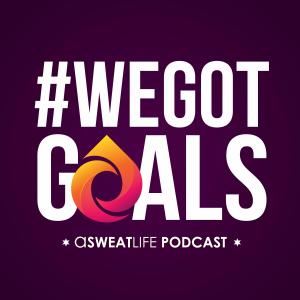#WeGotGoals by aSweatLife

A Deep Dive into Diet Culture with the Diet-Free Revolution Author Dr. Alexis Conason
Content warning: on this episode in in this post we’re going to be discussing eating disorders, eating disorder recovery, and diets. If those aren’t topics you’re ready to listen to, skip this one and come back.
This is our third week of our deep dive into the topic on diet culture on our podcast #WeGotGoals and we're getting to the question that started it all with Dr. Alexis Conason: what should we do instead of diet (more on the flaw in that question shortly).
But first, Dr. Conason is a clinical psychologist and certified eating disorder specialist in private practice in New York City. She’s a sought-after speaker, a researcher who has published in peer-reviewed journals, and is widely viewed as an expert on the topics of mindful eating, body image, and diet culture in the media.
She’s also the founder of The Anti-Diet Plan, a weight-inclusive online mindful eating program and is the author of The Diet-Free Revolution: 10 Steps to Free Yourself from the Diet-Cycle with Mindful Eating and Radical Self-Acceptance.
The book is an incredible resource for those looking to rebuild a relationship with food and their bodies that's rooted in a trust that your body is built to tell you what it needs. Diets teach you to rely on an external plan or lifestyle for your meals, leading you to ask questions like, "If I shouldn't diet, what should I eat?" And it was midway through the interview with Dr. Conason when I realize that the question itself is rooted in diet culture.
As a reminder, diet culture and its overarching idea that if we fit a certain body type we’ll be happy and diets are the way to get there. And because of that, we muting our bodies' signals to eat less in hopes of shrinking. Many of us spend so much of our lives on diets and feeling dissatisfied with our bodies, that nearly ninety percent of women report body dissatisfaction, Dr. Conason shared.
And this whole thing is a vicious cycle, body dissatisfaction is linked to things like depression and eating disorders.
In our interview, we talk through the 10-step process in her book Diet-Free Revolution that helps to get back in touch with the cues your body intelligently has built into it like hunger, cravings, and fullness. We also dive into how her start in obesity research led her to dedicate her life to anti-diet work instead of putting people on diets.
Resources:
- The Anti-Diet Plan, which also includes some free resources and details who should and should not take on this plan
- The Diet-Free Revolution book
- More on fasting and stress in women
- Evidence that diets don't work
- More on body dissatisfaction from researchers at the University of Wisconsin, who also examine how race and gender play a role
Past episodes in this deep dive into diet culture:
- Dr. Lindo Bacon shares the research that led to Heath At Every Size
- Judith Matz explains more on the psychology of your body on a diet
Some FAQs
- What’s a diet? Any time you make a change in how you eat for the purpose of weight loss.
- What is diet culture? A belief that thinness is a moral virtue and thinness is health. Therefore, it’s worth doing anything to achieve that status and when you get to that status, you’ll be happier and healthier.
- What exactly is obesity? And should you use that word when talking about someone else’s weight? In short, it’s complicated, based on the BMI *which has its own problems* and no. Here’s more research on the words we use and weight stigma.
- Why did we choose to use the word "fat"? The word fat is being reclaimed by many - especially those within the fat acceptance movement. To some, this word is loaded and will remain loaded, we want to honor that and we understand that. If we could address everyone on a 1:1 basis, we would use your words of choice (like Dr. Conason talks through). More on the word fat.






 Visit Podcast Website
Visit Podcast Website RSS Podcast Feed
RSS Podcast Feed Subscribe
Subscribe
 Add to MyCast
Add to MyCast